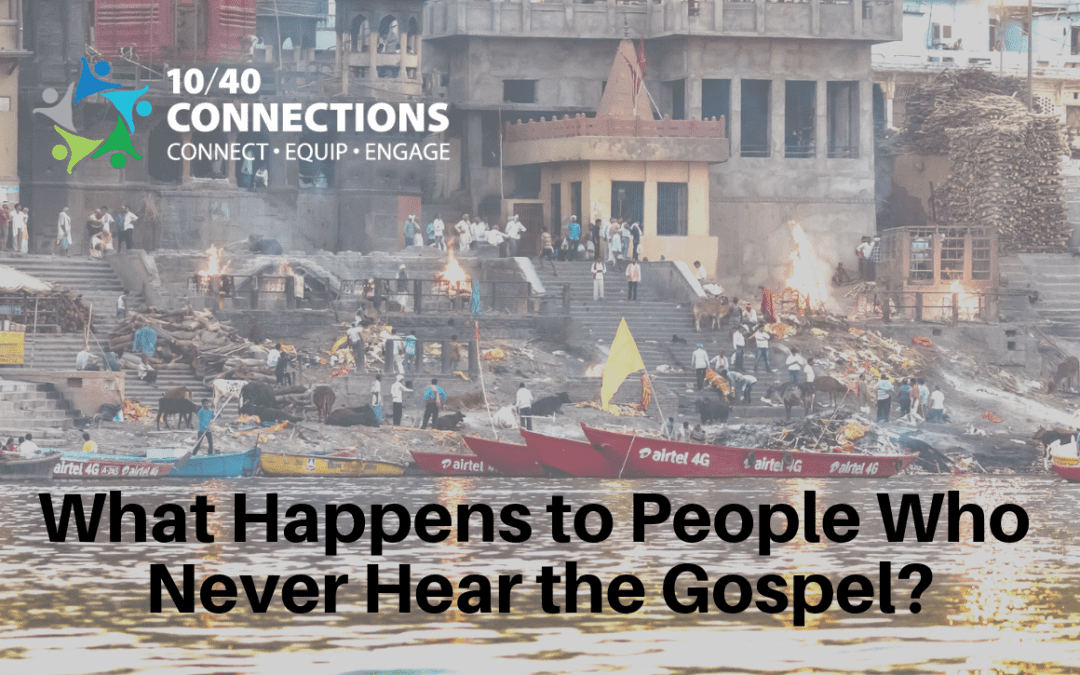As we enter into the new year of 2019, we thought we would address a question raised to us recently – “What happens to people who have never heard of Jesus? What happens after they die?”
It makes us sad to even ponder this question, and it also moves us forward with purpose. Let’s make this personal for you. Have you met someone who had literally NEVER heard the Gospel? We hope you have, and we hope you changed that sad reality for them! We live among this exact situation, so it’s a relevant question for us. Today we paused in a local market and tried to count people we could see from that spot – easily over 100 folks. The majority of them had probably never heard the story of Jesus in a way they could understand. It can be pretty overwhelming and eye-opening if you start considering every person you encounter as either saved or not yet saved. We are trying to train ourselves to see everyone through this lens so that our minds are hearts are constantly ready to notice open doors to share the Good News.
(Really we think a more personally applicable question is, “What happens to Jesus’ followers who never cared to make him known to the ends of the earth?” But we will save that question for another day.)
So here, with the Bible as our source of trustworthy insight (not feelings, hopeful/wishful thinking, traditions, or alternative spiritual books), we offer a couple of points that can help to work through this question, while also calling us to humble obedience to God’s global purposes.
1. Lean into the clarity of Scripture. Jesus communicates clearly in Scripture that unless we follow the One Way, the One Truth, the One Life who is Jesus himself, no one can enter into an eternal and permanent relationship with God (John 14:6). The good news is… a path actually exists that leads to God.
The word gospel comes from the Greek evangelionwhich means “good news” (eu = good and angellion = message). The amazing message of Jesus’ kingdom and his life, death, and resurrection is Good News because Jesus can save people from sin and conquer death. Through Jesus, people can find forgiveness, peace, purpose, and hope. The Apostle Peter in Acts 4:12 states clearly, “Salvation is found in no one else, for there is no other name under heaven given to mankind by which we must be saved.” That is, this eternal good news can be found nowhere other than in Jesus Christ.
If salvation can be attained apart from Jesus, then his intense prayer in the Garden of Gethsemane was not answered correctly. Jesus prayed for this exact thing to happen, “If it is possible…” (Matthew 26:39). That is, IF there is any other way for salvation, then Jesus did not want to die. Jesus’ plea was like a final check with God. “Father, are you sure this is the only way? Because if there is some other way than me dying on the cross and taking the world’s sin upon my flesh and becoming sin, then let’s go for that option!”
Among other scriptural references, these three passages reveal that there is no other path than Jesus (aka. the Way). Therefore…the cross.
2. Death is the “finish line” (i.e. no altar calls in the afterlife). The Bible speaks of a clear, permanent, fixed separation that comes at death. Jesus taught often about the dead and their separation from God. He described their abode as a place where the “worm never dies” and the “fire is never quenched” (Mark 9:48, cf. Isaiah 66:24). His reference to the city dump of Jerusalem (i.e. Gehenna) clearly communicated to his audience the finality, the uncleanness, the pain – a situation where no one wants to find themselves. Specifically, in Luke 16 Jesus shared a parable where the rich man cannot cross over the “great chasm…set in place” because no one can “cross over from there to us.”

People who have no relationship with Christ in this life can have no relationship with him after this life. Death is the finish line for believing and choosing. With the last breath, time is up and the day of decision has passed. Passages like Luke 16:19-31, 1 Corinthians 3:10-15, 2 Timothy 4:8, and Hebrews 2:14-15 show that death is the dividing line, and after that we face the Judge clothed either in our own righteousness or in Jesus’ righteousness.
Jesus never mentioned a second chance to know him after dying. He did mention either rewards or consequences for people. Hebrews 9:27 states, “Just as people are destined once to die, and after that to face judgment.” The passage does not say, “People die, then some are evangelized, then the judgment.” This would have been a great place to include that little addendum if there was another option!
(If we are being honest, we really wish that we could find any biblical reference to Jesus evangelizing people after death, but we can’t find it! He would do such a good job!)
3. God is both deeply loving and deeply just. Don’t be deceived by shallow love and shallow truth. It’s easy to say, “God is so loving and merciful that He will not allow someone to be permanently separated if they have never heard.” Of course, the Bible never even hints at that possibility. Rather, we see urgency to share the Good News of God’s love with others so that everyone can “come to repentance” (2 Peter 3:9). The early disciples were so radically transformed by the risen Christ that they risked and gave their lives to tell the Good News. What could fuel such passion and urgency if salvation were automatic for all people? Our mercy is not greater than God’s. Our justice is not greater than God’s. Our sense of fairness is not greater than God’s. God has provided the Way through Jesus; He then gives the Church the awesome responsibility to share that Good News everywhere.
The Apostle Paul in Romans 10 says, “How can they (non-Christians) call on the one they have not believed in? And how can they believe in the one of whom they have not heard? And how can they hear without someone preaching to them? And how can they preach unless they are sent?” Paul’s rhetorical “how” questions imply many times over that people cannot call on Christ unless someone explains the story to them.
Simply put, if a person can receive God’s forgiveness apart from Christ, that opens up a completely different system of belief. If salvation can be attained by human effort, or by monastic renunciation, or by trying to follow various commands, or by devotion, or by memorization, or by any way other than Jesus, then we are looking at a different religion. Buddhists, Hindus, Muslims, Tribals, and various cult-like groups have their own system for seeking to gain merit or please their god(s), but none involve the death and resurrection of Jesus. Because God is both loving and just, he has a plan. He came personally, then he empowers and sends the Church (you/me/us!) to all the world.
God’s global purpose includes you. That’s right, you are his plan so that this question “what happens to others” becomes completely irrelevant. God “does not want any to perish,” so what can we do? It’s time to share this amazing story with action, urgency, and commitment. Time to obey.
We will close with a fun kid story. The other day our eight-year-old son Eden showed us the need for obedience. Leslie was sitting in her room doing her quiet time when Eden walked in.
 E: Mom, I’ve packed to go to Ninevah.
E: Mom, I’ve packed to go to Ninevah.
L: Why are you going to Ninevah?
E: Remember God told me to go when I was 5. The time is now.
L: Why do you want to go to Ninevah?
E: Oh, I don’t WANT to go to Ninevah at all. But God told me to go there.
Daughter Joeli walked in: What are you all talking about?
E: How I and the family are supposed to go to Ninevah.
J: Isn’t Ninevah in Iraq now where ISIS is powerful?
E: Joeli, do you trust God or not when He says to go?
Ready and willing to obey God’s words…that’s what we all need. Hey, it may be time for you to head out and go find someone who has never heard of Jesus and do your part to make this sad question outdated!
Where Most Needed
† If you desire to donate by check, it can be mailed to:
10/40 Connections
2120 Northgate Park Lane, #400
Chattanooga, TN 37415
10/40 Connections is a 501(c)3 tax-exempt organization.


Jesus loves the LOST.
He loves them so much, he does not want any of them to go to HELL.
He who keeps his life will lose it.
Let us be Sea of Galilee Christians rather than Dead Sea Christians.
When Jesus saw the multitudes he had COMPASSION on them because they were as sheep without a shepherd.